Marriage Counseling with Capitalism
Writing by Rhys Lindmark. Illustrations by Audra Jacobi.
We are viewing a relationship therapy session between HUMANITY, CAPITALISM, POST-CAPITALISM, and a THERAPIST.
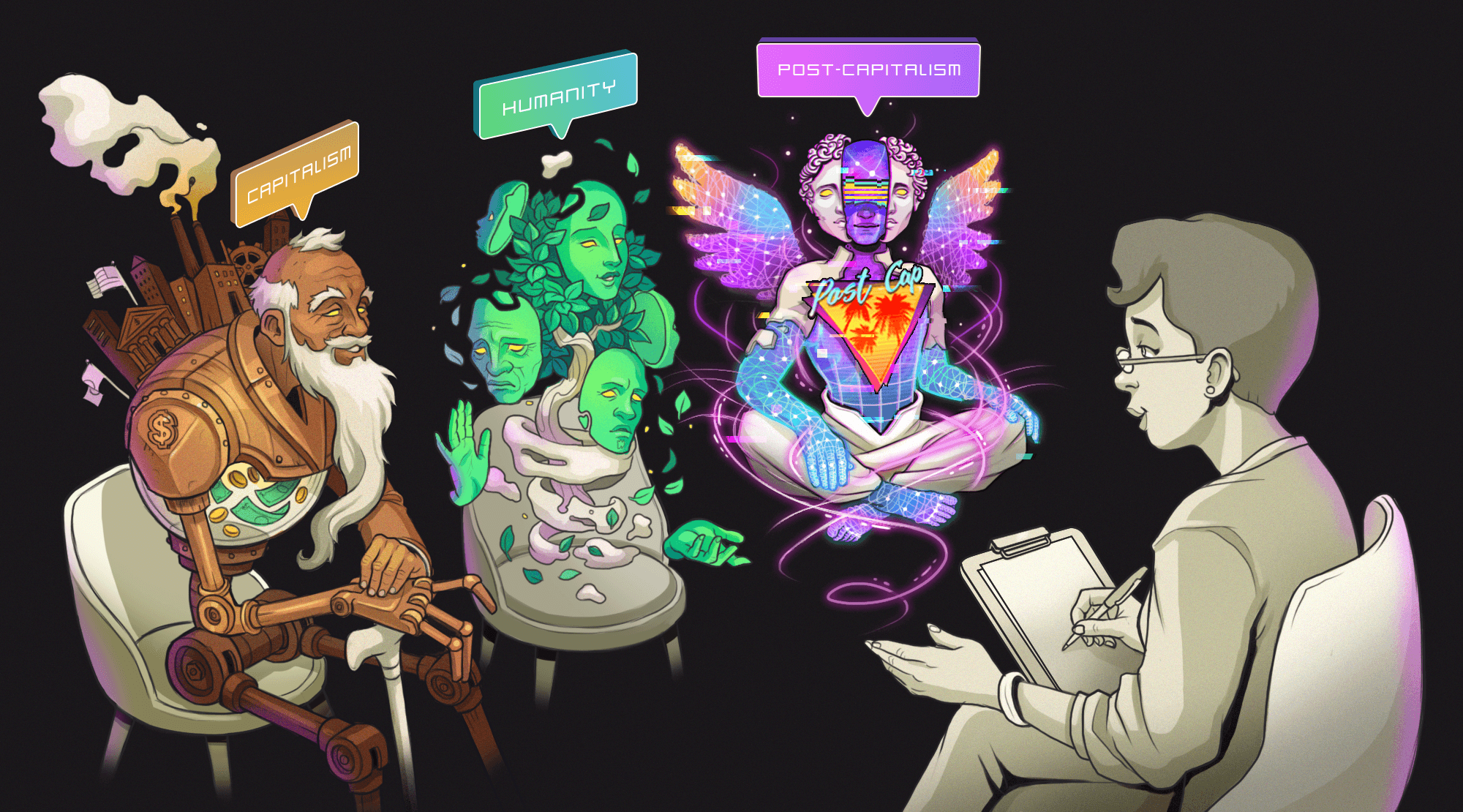
Post-capitalism rushes in.
Humanity, could you tell us why you wanted to have this session?
Cap—I’m not sure I love you anymore.
And Post-Cap—I barely even know you. I’ve been burned on non-capitalist relationships before, so I’m a bit scared.
- Bentoism: Zooming out to care about each other and the planet
- Generosity: Recognizing that many of us have enough and can give back
- Coherent Pluralism: Striving to look at issues from every angle
- Networkism: The rise of internet-enabled decentralized networks
A Brief (Relationship) History of Capitalism
Part I: Feudalism, The Agricultural Revolution’s Final Act
Before that, I mostly organized myself in hunter-gatherer communities. I was nomadic and food was scarce. But then the Agricultural Revolution came along and fed everyone. I ate a lot of wheat then. Now too, I guess.
I got into a weird cycle. More food meant I could have more kids. But then I’d have too many kids, so they’d get hungry and I’d have to farm more food. Rinse and repeat.
Part II: Industrial Revolution and the Birth of Capitalism
There was a gradual transition as I started to invent the printing press in 1440, double entry bookkeeping in 1450, and the joint-stock company around 1600. But I really felt myself begin to fall in love with Capitalism around the Industrial Revolution.
Part III: Struggles with (Post-)Capitalism in the 2020s
- Cap is too focused on short-term needs. I have new long-term needs, like fixing the climate crisis.
- Cap helped motivate me with financial incentives, but what happens when I have enough? Or when I feel abundance? I feel like Cap has made me too greedy.
- Now that 20th century narratives have played out, Cap doesn’t have a clear story for my future.
- Finally, Cap grew up with centralized institutions predicated on scarcity. They don’t understand new decentralized networks predicated on information abundance.
...Sorry, that was a lot. I know.
- First, we’ll look at Bentoism—a framework for meeting your long-term collective needs.
- Then, we’ll explore a Generosity—where those who have enough give back.
- After that, we’ll look at Coherent Pluralism—a way to understand many perspectives, but not be overwhelmed by them.
- And finally, we’ll look at Networkism—the power of digital networks and how the ideas above are manifest in them.
MINDSET #1: BENTOISM
Humanity’s Needs Find a Voice

Future Me represents your long-term personal needs like meaning and purpose. Future Me is your ideal, wiser self helping your current self.
Now Us represents your collective need for connection. It’s also when people help others meet their Now Me basic needs. Like giving to charity.
Future Us represents the long-term needs of humanity. It speaks for your kids, for future generations, and for the earth.
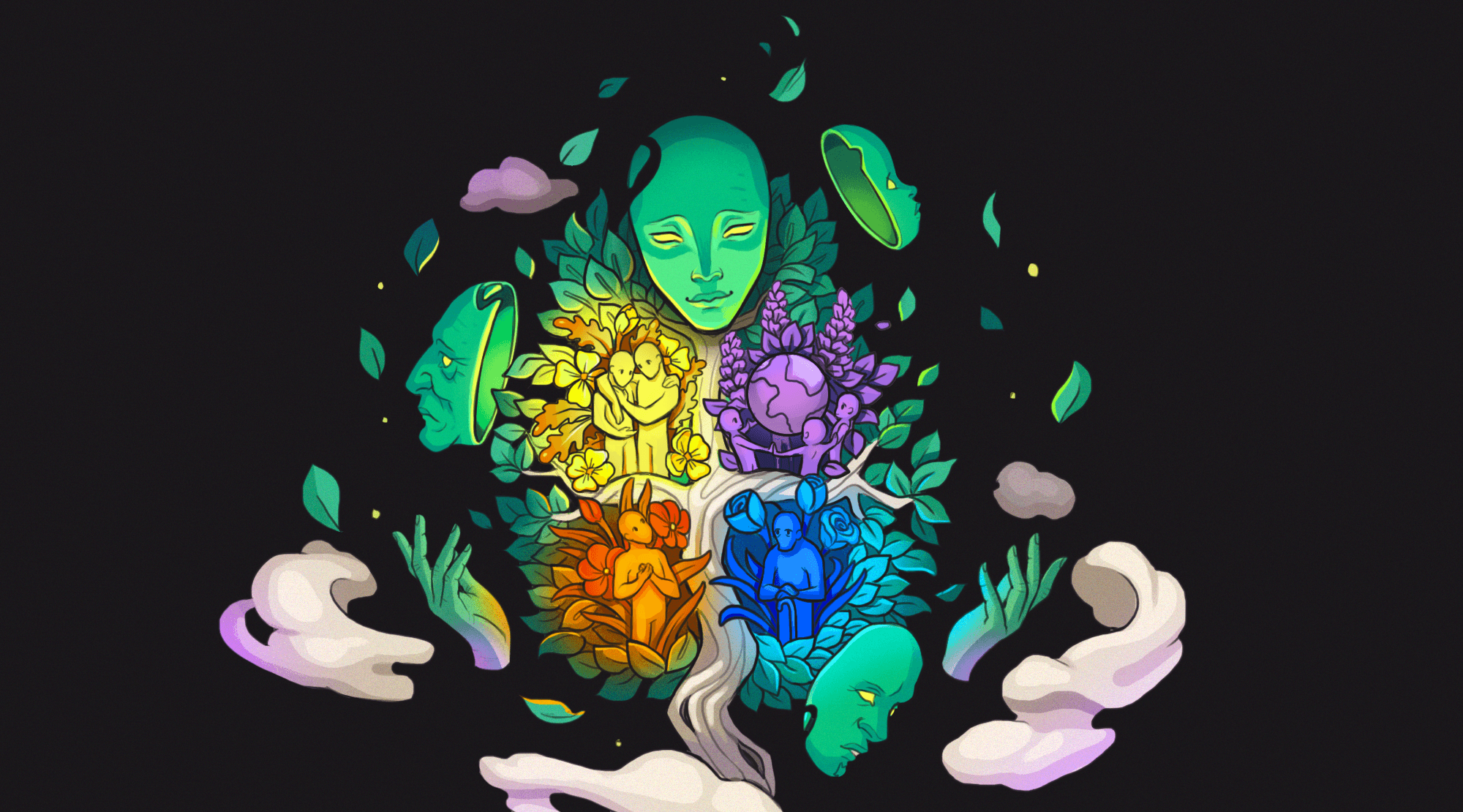
MINDSET #2: GENEROSITY
Future VR Experience: An Abundant Walk
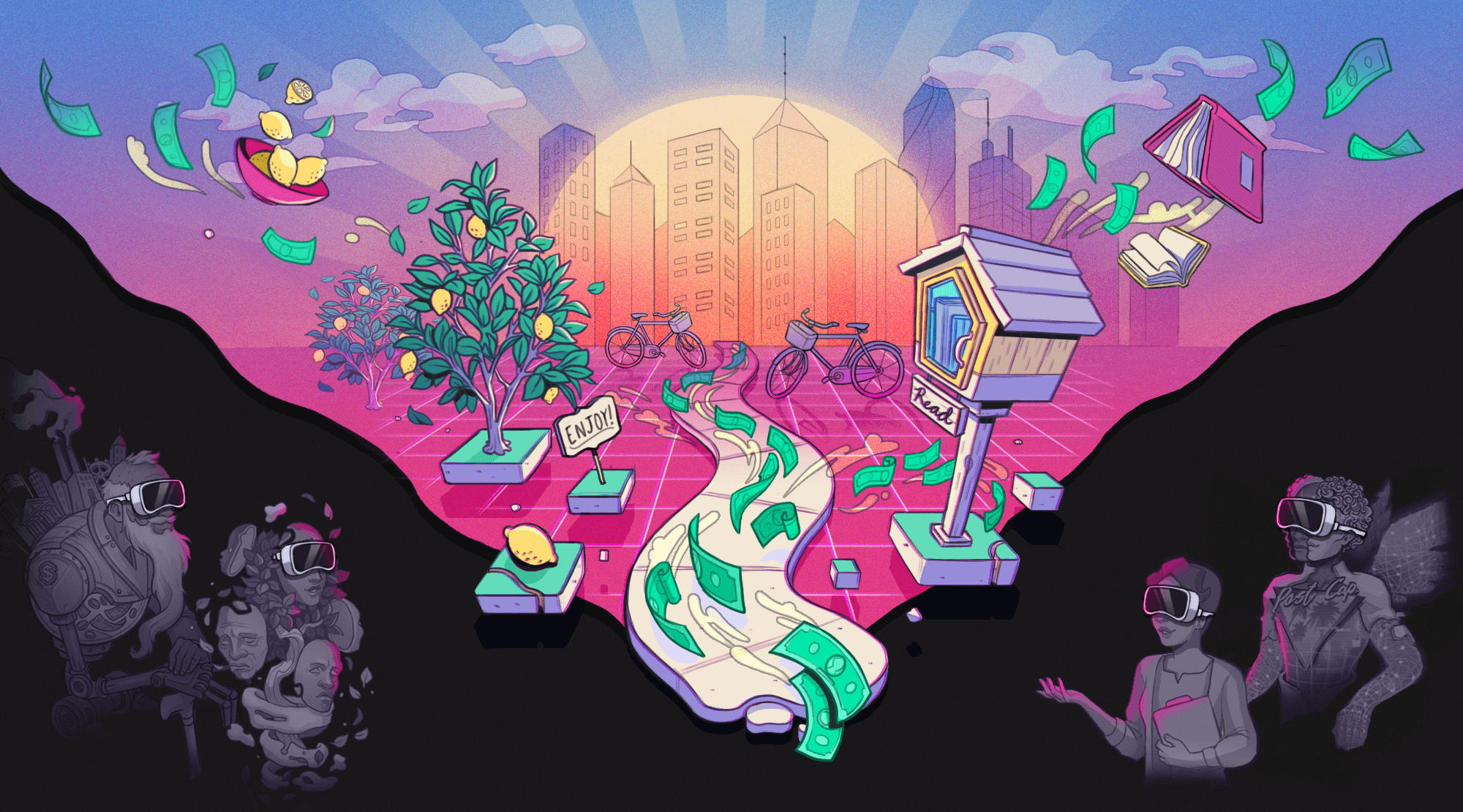
We’re walking down the street on a sunny day.
When we take a deep breath and zoom out, we suddenly realize the world is gifting beautiful things to us. We take a moment to appreciate the sun’s rays, and note in our journal—“I am grateful for the sun’s warmth.” The sun provides us with happiness if we dare to accept it.
We pass some fruit trees and decide to grab a lemon for tonight’s dinner. There’s a cherry tomato plant that says “eat me, neighbor!” We do. The flavor is brilliant.
We continue walking and happen upon a Little Free Library. The books inside are free, waiting to be read. A gift from us, to us. We take one and leave a nice note thanking the library steward.
Then we enter our local “real” library. In addition to books, this library lends out tools (hammers, etc.) and free museum passes. We’ll rent a shovel next week for some yard work.
There are thousands of free items offered on Craigslist every day in our city. We get a phone notification about free chairs at a house nearby. We take a look but pass for now.
We stop by a park to sit in the grass. On our phones, we look up some AirBnB listings for an upcoming trip. Each listing has a sliding scale where the owner notes how much they need the money. We book a cute home an hour away. Our credit card calculates the carbon emissions of our trip and offsets it by donating to Future Us to plant new trees.
We leave the park and head home. As we pass the largest intersection, there’s a meter that recognizes our phones and transfers $5 to the meter. We could take up to $25 back if we want, but decide not to. At the end of each day, the money is donated to our local community Now Us foundation.
But not everything has more money flowing through it. In fact, we’re diverting flows from existing systems—from consumerism and status games.
We take a left and head south. This intersection used to have three of the same jewelry store—like the mythical Starbucks on every corner. Now, they’ve been turned into places for our Now Me health: a yoga studio, a bathhouse, and a meditation room.
It reminds us of when we went to Times Square last week. Instead of being plastered by flashing screens advertising Coke and watches, half of the screens are off. The remaining ones are ads for therapy, community events, and gyms.
Part of this decline is demand-driven: customers spend less on Now Me but spend more on Now Us connection and Future Me long-term health. And part of the decline is supply-driven: many companies are public-benefit corporations and have legally binding charters that push them to positively impact society. It’s not that “bad things” like cigarettes don’t exist anymore. They’re just pushed much much less.
We live in a new Generous world, where people recognize their Abundance and use it to help Now Us and Future Us.
But now we have zoomed out to include Now Us and Future Us. Our new mindset allocates money towards those Us boxes, increasing the supply and demand for those goods.
We could also use laws or norms to meet those needs too. But I recommend markets :).
When you get a paycheck, where does it go? Does that money make you happier?
The first point is our shift towards Mindset #1: Bentoism. We are zooming out to our Now Us and Future Us needs. Those needs are met through a variety of mechanisms like law or norms, but also markets. Renewable electricity is now cheaper in many countries. Go markets!
The second point is that this Generosity is possible from Abundance / Now Me Overflow. It’s difficult to put money towards solar research if we don’t have enough food to eat. But because our basic needs are met, we can start allocating resources towards other needs. Does that make sense?
...Does this make me a socialist?
Ok, let’s put back on our VR headsets and explore the second experience. In this one, we’ll look at why everything can’t be Abundant.
Future VR Experience: Navi Explores Abundance For Positive-Sum Resources and Balance for Zero-Sum Resources
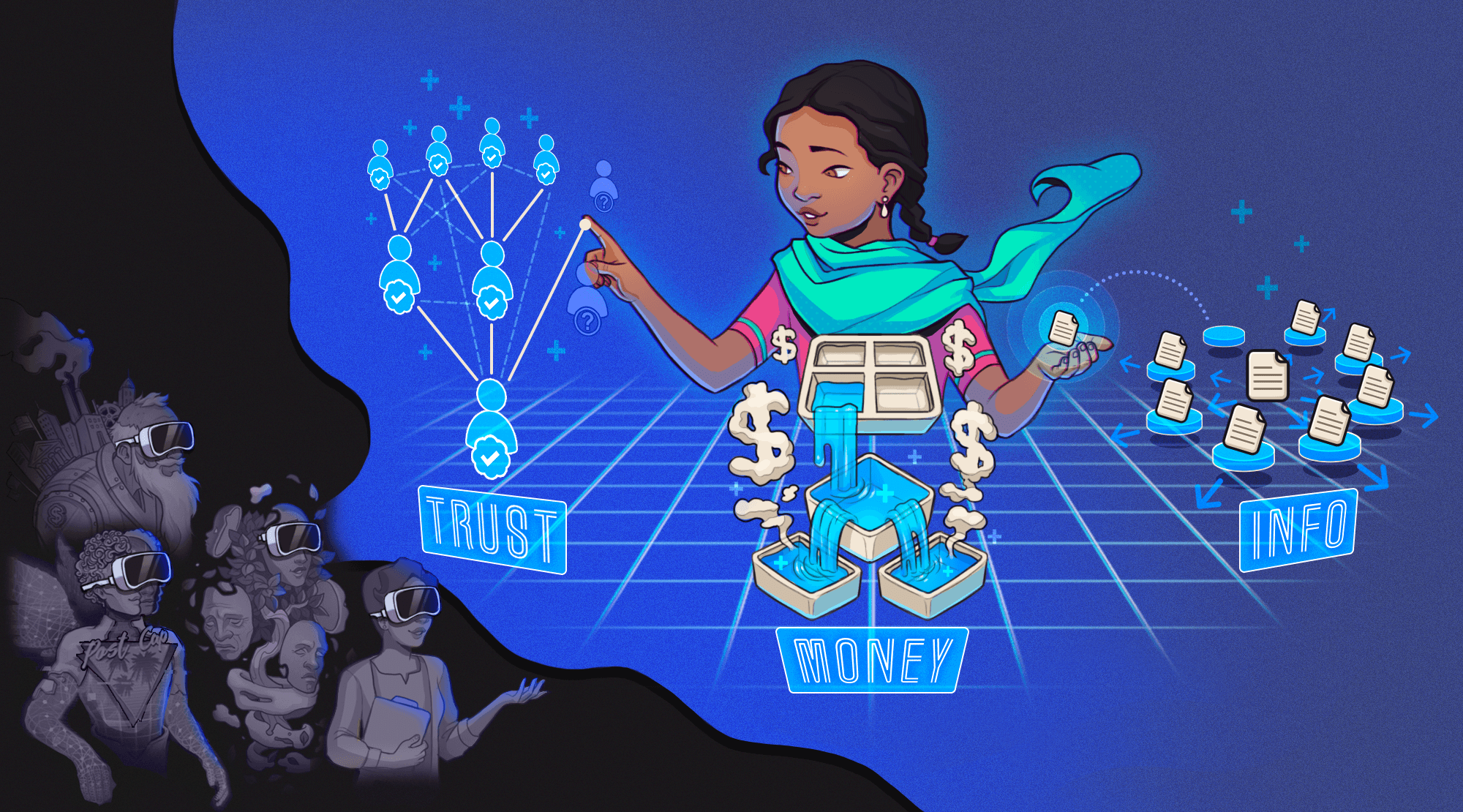
We’re watching a student, Navi, explore whether core societal primitives are zero-sum or positive-sum. Navi explores each and plays with them in her hands. For positive-sum, she explores trust, money, and information. For zero-sum, she explores status, attention, and power.
First, she explores trust.
She knows trust is becoming abundant during this next big transition. When she looks at the decreasing trust in centralized institutions like governments, it sure doesn’t seem like there’s becoming “more trust” in the world. But she understands the main shift is in how trust is created—centralized and top-down vs. decentralized and bottom-up.
Bottom-up networks abstract and commoditize trust. Things that are commoditized become abundant. An acre-plot of land, and the tools to harvest food on it, was an abstraction that made food abundant. Factories abstracted the production of goods, and now goods like t-shirts are abundant.
Code abstracts trust. Bitcoin uses math to abstract the process of creating a trusted ledger. Sharing economy platforms use rating systems to abstract the process of creating a trusted transaction. Navi consumes information from a trust network of experts, science, and crowd-based citizen journalism.
She understands that trust is positive-sum. When she decides to trust AirBnB, other people can also trust it. In fact, when she trusts it, others are even more likely to trust it. There is not a finite amount of trust to go around. Trust begets trust. And trust is good. Navi tries to create trust.
Second, Navi explores money.
It seems to be zero-sum. Or at least rivalrous. If Navi has $1 in her pocket, it can’t also be in someone else’s pocket.
However, the properties of money change when Navi takes a moment to reflect and zoom out. She remembers that money is a means, not an end. Money helps Navi meet her Now Me needs. But once she has Now Me Overflow, she can give that money to help others meet their Now Me needs (and help meet her Future Me needs of self-actualization).
And from this lens, money seems to have positive-sum-like properties. Technically, the $1 isn’t in Navi’s pocket anymore. But that doesn’t actually matter to her. It’s actually better for her if it’s in someone else’s pocket.
When people say that “capital is abundant”, this is what they mean. Money doesn’t need to be hoarded anymore.
So money itself is still rivalrous. But it has strong “overflow” properties that make it positive-sum for meeting needs.
Third, Navi explores information.
This is the easiest to understand. It’s the difference between atoms and bits. Atoms are rivalrous—they can only be in one place at once. But bits are non-rivalrous—she can duplicate and share information around the world at zero marginal cost.
Knowledge is information that has been nicely packaged for human use. This is positive-sum. Knowledge begets more knowledge. We’ve seen this flywheel accelerate since the Renaissance.
In Navi’s world, knowledge is not hidden behind paywalls. Copyright isn’t enforced through laws, but through norms. Information wants to be free and it is. People allocate money to the best knowledge and art, but after it is created. Walled gardens no longer exist, so creativity and knowledge blossom.
Now though, Navi must explore the trickier resources—those with zero-sum properties.
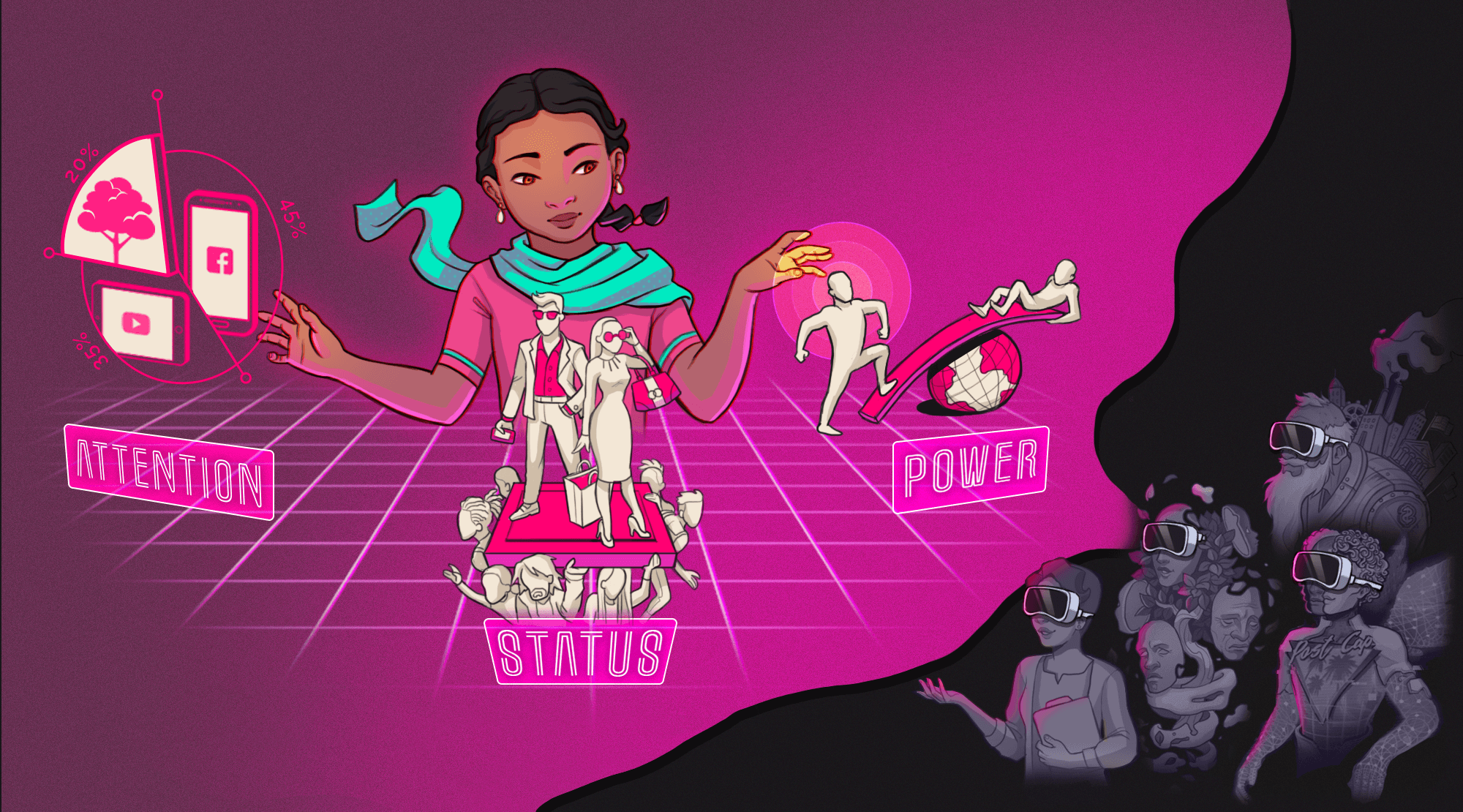
For the positive-sum resources, Navi’s life choices are easy: create as much trust as possible, give money back after Now Me Overflow, and share information. But with zero-sum resources, it’s more difficult. We can’t just create more of them (making them abundant). Instead we need to think about their distribution.
First, Navi explores attention.
This is zero-sum. There are only so many seconds in a day. If Facebook takes some of her seconds, YouTube cannot have them.
Attention cannot be created, only directed or harvested.
Because attention is finite, our mindset towards it should be one of balanced allocation. Time Well Spent, not time spent scrolling.
Second, Navi explores status.
Navi knows that status is hard-wired into humans. Apes have one kind of status signal—dominance. Homo sapiens added a different kind of status—prestige. Both types of status are relative: they determine our place in the social ladder.
Navi saw a strong ape in the zoo. But there was a stronger ape, which was dominant. Navi saw a famous celebrity with lots of Instagram followers. But there was another celebrity with more followers, and the first celebrity was forgotten. They barely even showed up in her feed.
Because status is a zero-sum ranking, it should be treated differently than positive-sum resources like information. It’s also different than an “enoughness”-based resource like money. Unlike money, status doesn't appear to have diminishing returns. There’s no point where Navi’s status will be “enough”. She cannot Now Me Overflow with status.
Instead, Navi participates in a society where the long-term goal is to minimize the difference in status. A balanced allocation. One could view this as striving for “equality”. But that’s not how Navi (or others) view it. It’s more like a catch-up mechanism in games. Instead of the winner getting further ahead, there are mechanisms in place to help the other players. An infinite game, not a finite one.
Still, this “balance” mindset towards status is sometimes difficult for Navi. She wants the best friends, and status helps. Sometimes, Navi sees people who seem to climb the ladder without helping anyone else up.
Nevertheless, Navi self-domesticates herself like humans have done before.
It’s good to have a “balance” mindset for zero-sum resources like status. But Navi knows there’s another vector—what should we allocate status to? If status is zero-sum by nature, how can we make it high impact? Like Time Well Spent, Status Well Awarded.
The status signals in the 1900s and early 2000s were broken. People still signaled status with luxury items and conspicuous consumption. In Navi’s time, status is more directly coupled with impact. When elites have Now Me Overflow, a choice to own three houses is low status, while a choice to give to others is high status.
Paradoxically, pushing for a balanced status ranking is high status.
If humans must compete over status, that status should be intertwined with impact.
Third, Navi explores power.
Again, power is a zero-sum relative game. Power is your ranking on the sum of the other resources (status, money, attention, trust). It is your ability to use other resources to get what you want.
In the 21st century, power was still hoarded. Although money didn’t make people more happy after Now Me Overflow, it still gave them more power. Bill Gates was no happier than other happy people. But he had much more power.
Hoarding power makes sense when the future is uncertain and you can’t trust that things will work out for you. But power became less important as trust became abundant. Instead of power, humans focused on meeting their needs, and those of society.
Like with status, Navi understands our goal with zero-sum power: a balanced allocation. To create a resilient system, we want power to be evenly distributed in the system.
Navi closes her lesson and goes outside to play an infinite game.
First, the positive-sum resources: Trust is positive-sum and will become abundant. Money is rivalrous, but we can make it positive-sum by using it as a means for meeting our needs, which allows us to do Now Me Overflow. Information has zero marginal costs and knowledge is positive-sum, so we should encourage a feedback loop there by breaking down any barriers to knowledge sharing.
Networkism is the shift from centralized institutions to internet-enabled decentralized networks. Coherent Pluralism is a response to our decentralized information ecosystem—individuals need to sample lots of different perspectives to make a holistic decision.
Let’s explore Coherent Pluralism first.
Mindset #3: Coherent Pluralism
Future VR Experience: Growing Up and Learning New Perspectives
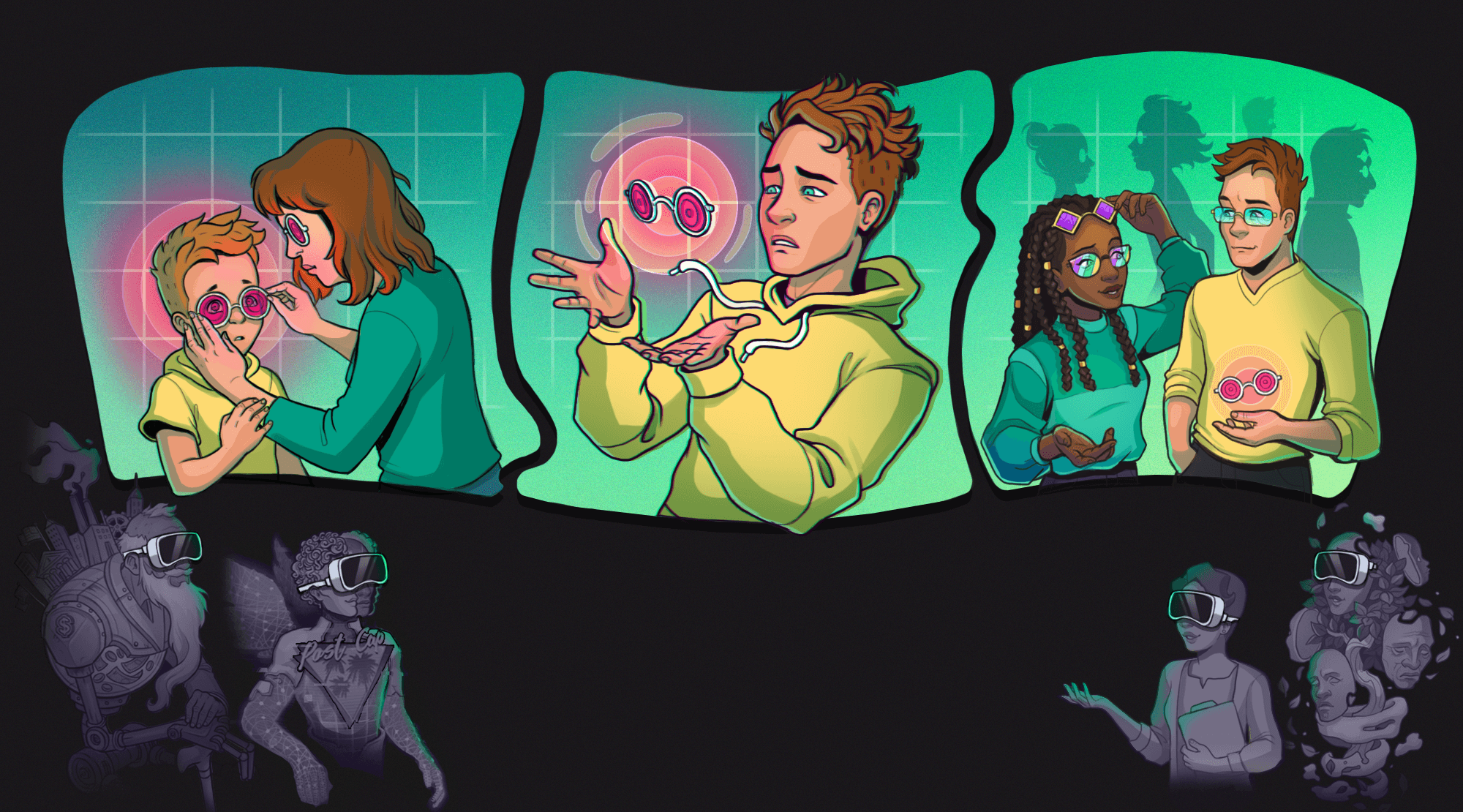
We are born into the West Borough Baptist Church.
Like all children, our parents give us glasses to help us make sense of the world. In our unique case, we see soldier’s funerals as retribution—God’s will for letting gays in the military. But we’re not yet aware that we’re even wearing glasses! It’s just the way the world is. Normal.
Our first glasses represent our childhood programming and socialization.
Eventually, we meet others whose glasses tell them that funerals are sad, not deserved. At first, we don’t understand those people and are scared of their conclusions. But finally, we realize something crazy—we have glasses on! And even more crazy—we can take them off! We do so, and no longer see funerals as retribution. But neither do we see them as sad. We don’t really understand much anymore. What is true?
After a bit of time, we try on a different pair of glasses. They help us see soldier’s funerals as a sad thing. We build up a collection of glasses: gold glasses, heart-shaped glasses, and some glasses with just one lens—a monocle! We even find a pair without lenses—for hipsters! We meditate to get better at inspecting our glasses. We also realize that we’ll never be able to fully remove our glasses from childhood. Finally, we truly grasp that everyone else around us has glasses too. When we talk with others, we actively ask them about their glasses and they ask about ours.
We’ve completed our developmental journey and now embody Coherent Pluralism.
At the beginning, as a kid, our worldview was Coherent, but not Plural. We knew right from wrong, but only had one pair of glasses. As we grew up, we replaced our Coherence with Pluralism—we knew of many glasses but couldn’t make sense of the world. And now, we have both. We wear lots of glasses (Pluralism), but still have a clear picture of reality (Coherence).
We take off our current glasses and go to sleep.
- First, the shift towards post-capitalism is part of our evolution as a species and as individual humans. We’re becoming more Coherent and more Plural.
- Second, you should have a Coherently Plural mindset about these mindsets. You shouldn’t just take these mindsets as gospel. But you also shouldn’t reject them outright.
- And third, Coherent Pluralism is the best way to consume information on the internet.

Mindset #4: Networkism
Future VR Experience: New Digital Networks vs. Old Centralized Institutions
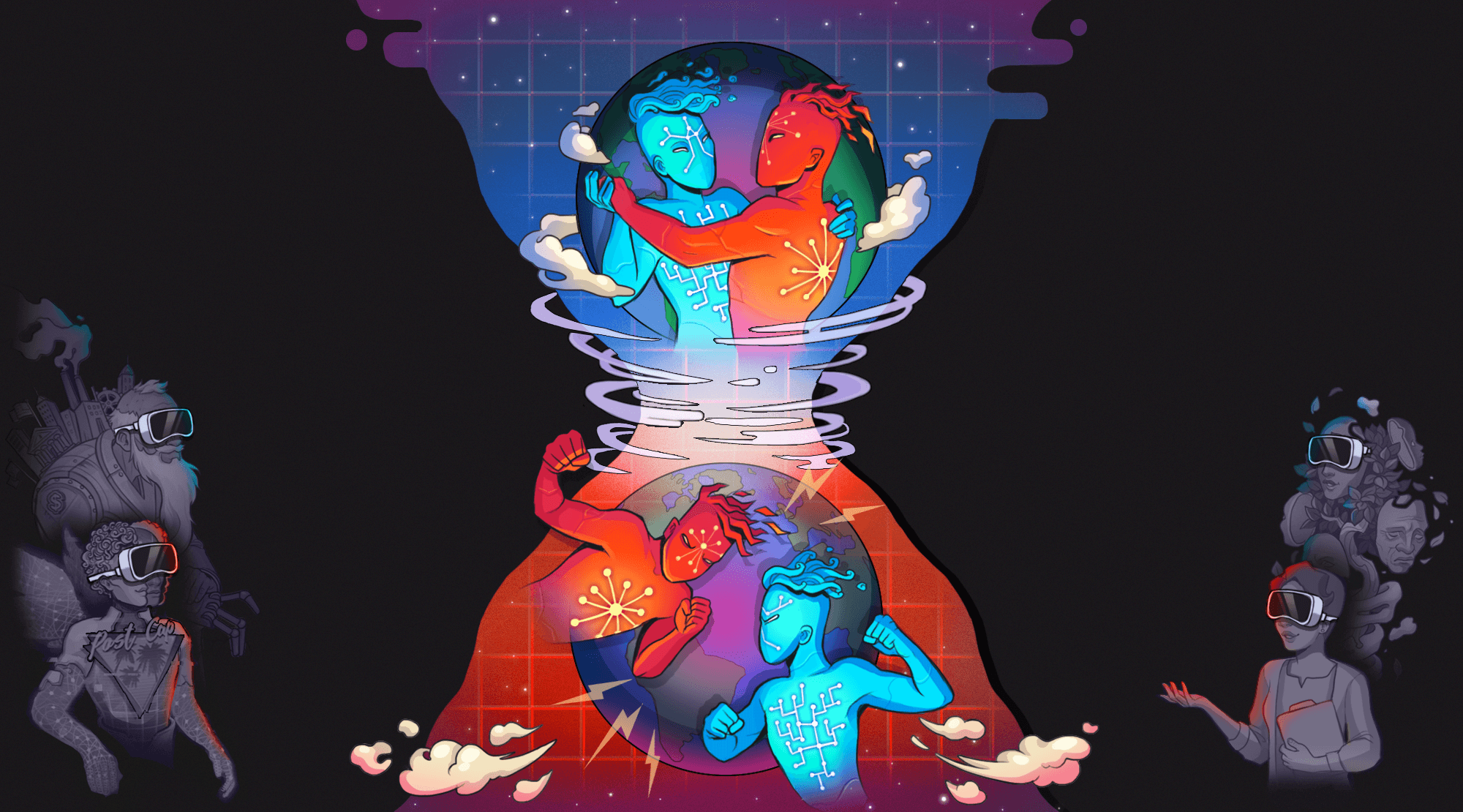
We are fighting a battle for the future, and we might just win.
We are the new—a network of bottom-up decentralized networks. And they are the old— top-down centralized institutions.
At the beginning, they’re more powerful.
They control capital with banks printing money, control information with the media, and control education with universities. And of course, nation-states have a monopoly on violence.
All of these have existed for hundreds of years. There are only a few new nation-states, banks, media companies, or universities. It’s hard to express our voice, to fight back, to change the system from within.
But we do have some power. The power to exit.
First, we issue A Declaration of the Independence of Cyberspace, and claim that “You have no sovereignty where we gather.” You no longer control all information.
We then create peer-to-peer electronic cash that isn’t controlled by a financial institution. You try to find us, but we hide behind cryptography and pseudonymous mailing lists. You no longer control the supply of money.
We create platforms for learning and sharing ideas, and alternative networks of accreditation. You no longer control all education.
You still have a monopoly on violence. We don’t challenge that, and hope for a peaceful transition.
As we fight and build, new mindsets show up in each of us.
In the past, new mindsets were only embodied in centralized institutions. (Anti-)slavery movements were implemented as the laws of nation-states. Financial maximization was manifest in companies.
But it’s a new millenium. The post-capitalist mindsets of Bentoism, Generosity, Coherent Pluralism, and Networkism are more quickly expressed in networks than in institutions.
First, networks manifest Bentoism. As governments around the world fail to coordinate around climate crisis, we push to fight it, and to address the other needs of Now Us and Future Us. We have no leaders, but Greta is a good steward. She sees the crisis clearly, speaks truth to your centralized power, and coordinates internet-based movements with #FridaysForFuture.
Second, networks manifest Generosity and Abundance. Generosity is expressed, not through governments increasing taxes, but rather through individuals self-taxing to their networks. People give money to hashtags on #GivingTuesday. Those hashtags redistribute it programmatically or through decentralized decision-making processes.
Third, networks manifest Coherent Pluralism. The internet has native support for both Coherence and Pluralism. Pluralism is represented as multiple feeds and as annotations from The Other Side. Coherence is repetition: the more the network shares and builds on a concept, the more it sticks.
And fourth, networks manifest Networkism itself. This is the mindset that bottom-up, digitally-enabled networks will outcompete old centralized institutions. The pro-network mindset propagates most easily on networks. It occasionally shows up in old forms: as siloed internet banking, Ivy League-led MOOCs, and digital newspapers. But those are just stepping stones.
We, internet-enabled networks, will become the dominant institution. It’s just a matter of time.
We fight. We exit. Time passes, and passes again. And now, finally, we have won.
New networks are the dominant institution. This doesn’t mean old institutions have gone away. The Church still co-exists with companies and nation-states. But it’s less powerful. So too, with the old centralized institutions of the 20th century. They exist, but in the shadows.
The new is here.
News is co-created and consumed by armies of citizen journalists.
Academic institutions hundreds of years old have been eclipsed by networks of teachers, learners, and researchers. Open-access pre-prints are the default, and peer review is conducted by the online crowd.
Blockchain-enabled networks eclipse central banks. The banks tried to fight back, first with regulations, and then with their own digital currencies. But it wasn’t enough.
As governments lost their monopoly on printing money, they were also outcompeted on providing public goods to local communities. Civil society blossomed again.
Institutions that we co-created with capitalism have been diminished. Networks that were co-created with post-capitalism are here to stay.
…
And finally, after many years, the fight becomes a dance. New networks collaborate with old institutions. There’s no winning. Instead, there’s simply the continued emergence of new societal myths as time unravels.
Conclusion
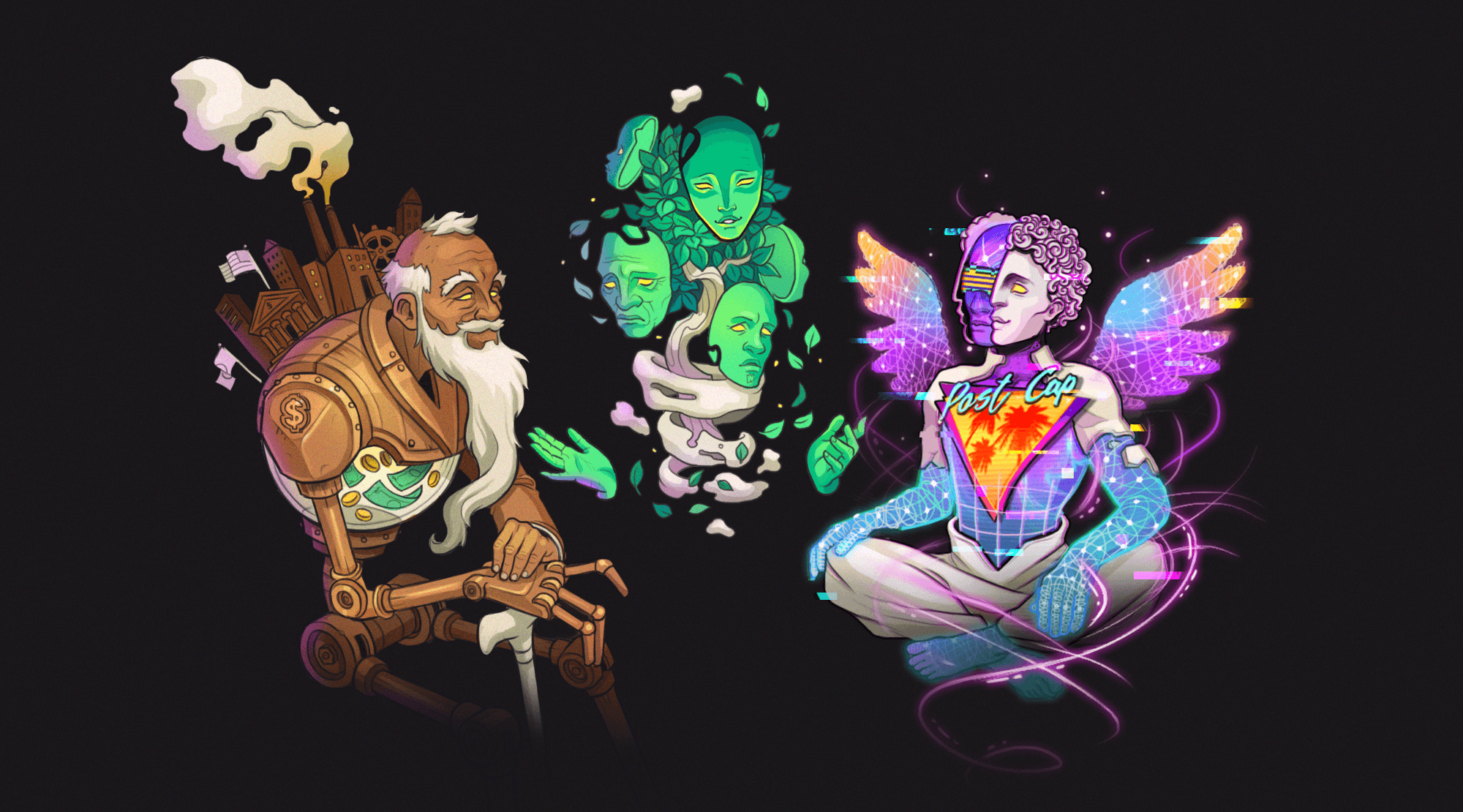
First, to Cap:
I want to stay with you, at least for now.
Not all markets are bad. Money is a means.
Markets and money can be used for good. Previously, they were just missing some variables. But now they can be “put to work” for my newly realized Bentoism needs of Future Me, Now Us, and Future Me.
Now I can recognize when I have enough money—when I have Abundance and can be Generous. Greed made more sense in the past. But now I can use Now Me Overflow to give back.
Also, I’m learning about my new networks for sensemaking—for propagating, curating, and synthesizing information and knowledge. I want to take personal responsibility for Coherent Pluralism, and build information networks that recognize this in their users.
Finally, there are institutions that co-evolved with you, but aren’t you. These centralized entities were good then, but aren’t in alignment with a networked future. I’m excited to explore bottom-up decentralized networks for money, learning, and providing public goods.
So, yeah. I thank you for the journey we’ve gone through until this point. I don’t reject you as a person. However, I do see your behavior (and the behavior of your friends) as negative for me. But I think there’s a path forward.
And to Post-Cap:
I’d love to keep exploring our relationship. I’m beginning to understand you better.
I could see us co-creating a beautiful future together. It has all of the same underlying primitives that I said to Cap: zooming out to recognize needs (Bentoism), my own enoughness (Abundance), the push for empathy, perspective, and clarity (Coherent Pluralism), and the power of digitally-enabled institutions (Networkism).
We could build that together. With you, I don’t have any baggage but I also don’t have a solid foundation. Cap and I have a history. Inertia. But you’re new. A blank slate.
This transition won’t happen quickly. A generation or two, maybe. An evolution, not a revolution. We are all constrained by the Law of the Adjacent Possible.
But it seems like both of you could help me manifest those underlying primitives. We can co-parent Future Me together.
And, well *closes eyes* that you two (Cap and Post-Cap) are just mindsets.
In the end, capitalism is just a shared story. A shared myth. It's shared language we use to describe a shared web of connected concepts. This is true about post-capitalism as well.
In the end, I can make you two go away. That’s closer to reality.
Even the idea of me, of Humanity. That’s just a metaphor. I am not actually a “thing” that spans the entire earth.
There’s just you, the reader, sitting at home and reading this on a screen. Alone.
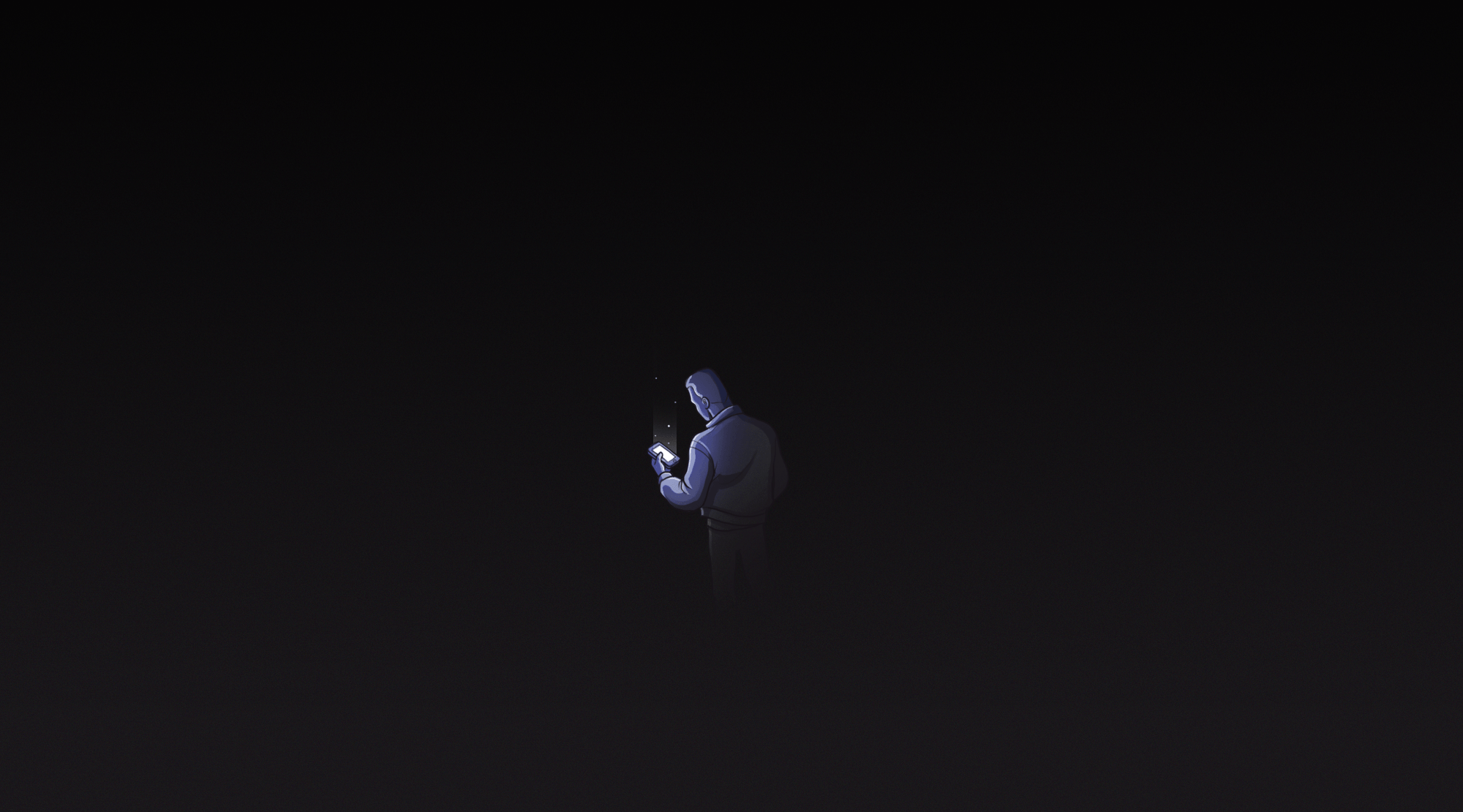
But the four underlying primitives matter.
Recognize we’re all interconnected. Think about needs. Help yourself, and help others. (Bentoism)
Recognize that you may have enough. Give to others. You don’t need to win. (Generosity)
Be curious. Explore your own mind. Try to understand others. (Coherent Pluralism)
Appreciate our new sociotechnical moment. Look to update our existing institutions while building new ones. (Networkism)
Even though you’re alone, you can co-create shared stories for a positive future. I don’t care whether we call it capitalism, or post-capitalism, or The Thing That Happens After We Grow The Fuck Up or whatever.
But I hope you strive for immense progress, while celebrating the small wins.
Thanks for reading, and good luck.
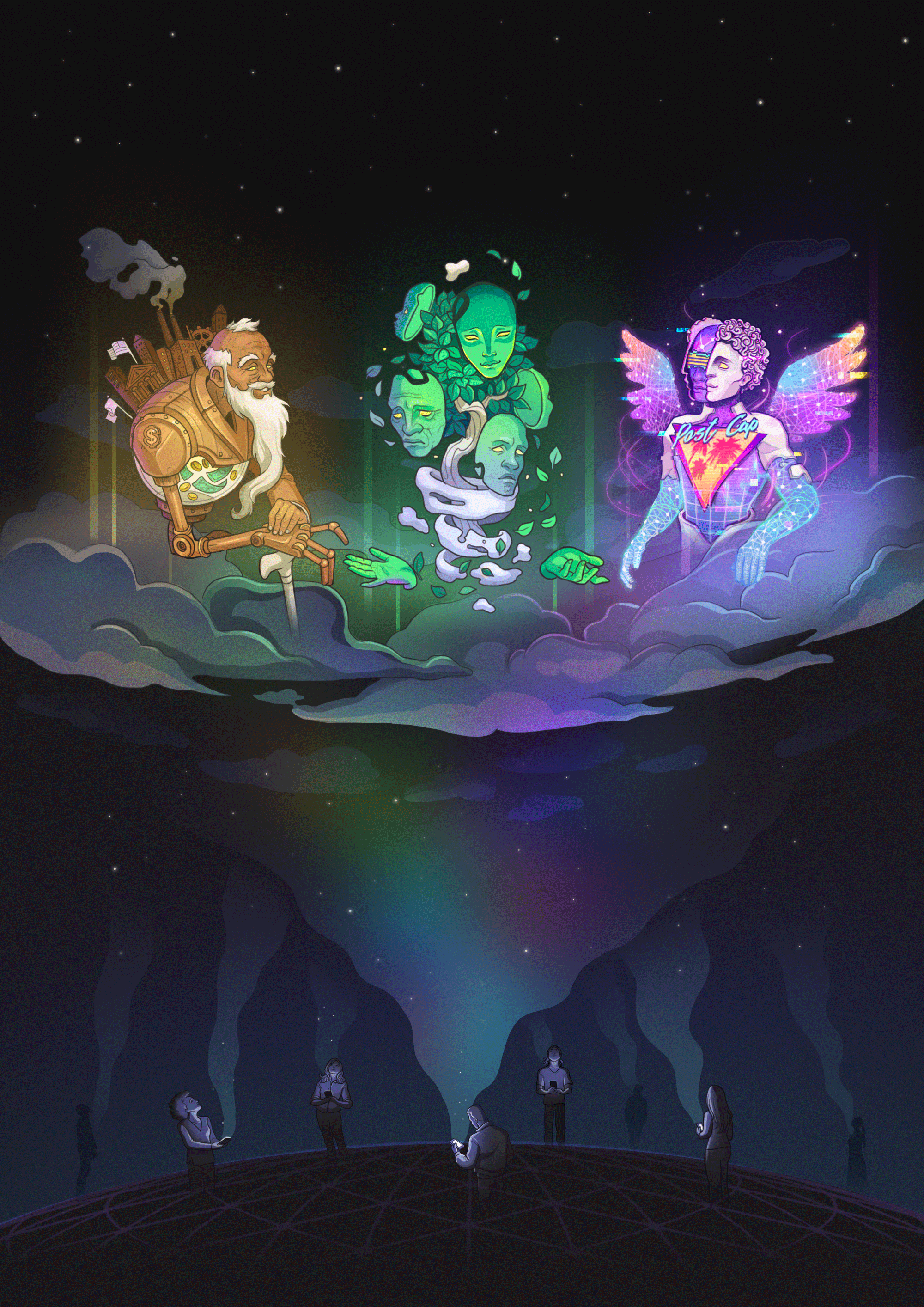
If you have feedback, are interested in learning more, or want to help catalyze this paradigm shift, please:
- Check out the Roote Fellowship
- Reach out over email or Twitter
- Join my newsletter
We'd love to hear from you!
If you would like to buy these images as a t-shirt, check out our Roote store here.
Thank you to everyone who helped with this essay. First and foremost, thanks to Audra Jacobi for creating these amazing illustrations (and my brother John Lindmark for the page design). Thanks to my peers in the Write of Passage cohort for their feedback on rough versions of this essay: Oshan Jarow, Packy McCormick, Joseph Wells, Adrienne Tran, Jessy Lin, and especially to Suthen Siva and David Perell for organizing the cohort. (Check out everyone’s essays here!) Finally, thanks to various other friends for giving feedback throughout: Anirudh Pai, Adam Segal, Nathan Schneider, Neha Narula, Yancey Strickler, Yaya Zhang, Jessica Watson-Miller, and Jim Rutt.
Thanks to Milan Griffes for finding typos.